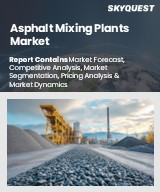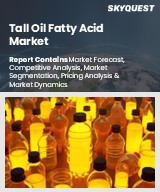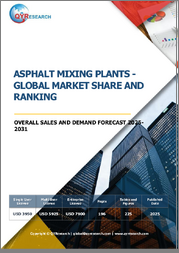
|
시장보고서
상품코드
1636687
재생 아스팔트 시장 예측(-2030년) : 제품 유형별, 유형별, 리사이클 프로세스별, 용도별, 최종 사용자별, 지역별 세계 분석Recycled Asphalt Market Forecasts to 2030 - Global Analysis By Product Type, Type, Recycling Process, Application, End User and By Geography |
||||||
Stratistics MRC에 따르면 세계 재생 아스팔트 시장은 2024년 76억 달러를 차지했습니다. 예측 기간 동안 6.8%의 연평균 복합 성장률(CAGR)로 성장하며 2030년까지 112억 달러에 이를 것으로 예상됩니다.
재생 아스팔트는 재생 아스팔트 포장(RAP)으로도 알려져 있으며 도로 및 주차장과 같은 기존 아스팔트 표면의 분쇄 또는 제거에서 얻은 재료입니다. 아스팔트는 파쇄, 가열, 새로운 아스팔트 바인더와의 혼합에 의해 처리되어 건설 프로젝트에서 재사용에 적합한 재료가 됩니다. 이 지속 가능한 방법은 폐기물을 줄이고 천연 자원을 보호하는 새로운 포장의 제조에 오래된 아스팔트를 재도입합니다. 재생 아스팔트는 도로 건설 및 유지 관리에서 완전히 새로운 재료를 사용하는 대신 비용 효율적이고 환경 친화적인 옵션을 제공합니다.
증가하는 도시화와 인프라 개발
도시화의 진전과 급속한 인프라 개발은 건설 프로젝트에서 재생 아스팔트 수요를 촉진하고 있습니다. 도시가 확대되고 도로망이 성장함에 따라 비용 효과적이고 지속 가능한 재료의 필요성이 커지고 있습니다. 재생 아스팔트는 친환경 솔루션을 제공하여 폐기물 및 처녀 재료에 대한 수요를 줄입니다. 도로의 재포장과 새로운 건설에서의 사용은 환경 목표와 경제 효율성을 모두 지원하며 현대 인프라 개발의 인기있는 선택이 되었습니다.
표준화된 품질관리 부족
시장에서 표준화된 품질 관리가 이루어지지 않기 때문에 제품 성능에 편차가 생겨 도로의 내구성과 안전성에 영향을 미칠 수 있습니다. 명확한 지침이 없으면 재료 조성, 가공 방법 및 오염 수준의 변동은 열악한 아스팔트를 초래하여 수명을 줄이고 유지비를 증가시킬 수 있습니다. 이러한 일관성은 재생재료 사용에 대한 계약업체나 정부기관의 신뢰를 훼손하여 시장의 성장과 채용을 제한할 수 있습니다.
정부의 규제와 정책
정부의 규제와 정책은 지속가능성을 촉진하고 환경에 미치는 영향을 줄임으로써 시장 성장에 중요한 역할을 합니다. 많은 국가에서는 도로 건설에서 재생 아스팔트 포장(RAP)의 사용 기준을 마련하고 재활용 및 재사용을 장려하고 있습니다. 규제는 재생재료를 사용하기 위한 감세와 보조금 등 환경친화적인 관행의 채용을 장려하는 경우가 많으며, 재생 아스팔트 수요를 높여 환경 목표를 지원하고 있습니다.
훈련받은 전문가 부족
시장에서 숙련된 노동자의 부족은 재생 재료의 적절한 처리 및 적용을 방해할 수 있습니다. 숙련되지 않은 작업자는 효율적인 아스팔트 재생 기술에 어려움을 겪을 수 있으며 품질이 안정되지 않고 도로 건설의 성능이 최적이 아닐 수 있습니다. 이로 인해 유지 보수 비용이 증가하고 내구성이 저하되고 인프라 프로젝트의 안전성이 저하될 수 있습니다. 또한 업계 내 혁신과 첨단 기술의 채용도 제한됩니다.
COVID-19의 영향 :
COVID-19의 대유행은 공급망을 혼란시키고 건설 프로젝트를 지연시키고 인프라 정비 수요를 줄임으로써 시장에 큰 영향을 미쳤습니다. 운영 중단과 노동 부족은 재활용 사업에 지장을 주었고 정부 인프라 지출 예산 감소는 시장 성장을 더욱 둔화시켰습니다. 그러나 이 위기는 지속가능한 재료의 중요성을 돋보이게 하고 경제가 회복됨에 따라 재생 아스팔트와 같은 비용 효율적이고 환경친화적인 솔루션에 대한 수요가 높아질 것으로 예상됩니다.
예측기간 동안 신설 아스팔트 슁글 분야가 최대가 될 전망
새로운 아스팔트 단일 분야는 예측 기간 동안 가장 큰 시장 점유율을 차지할 것으로 예상됩니다. 지붕을 갈아 넣을 때 종종 제거되는 이러한 싱글에는 재활용 및 도로 건설에 재사용 할 수있는 아스팔트가 높은 비율로 포함되어 있습니다. 오래된 싱글을 재생 아스팔트 포장(RAP)으로 가공함으로써 건설 산업은 폐기물을 줄이고 자원을 절약하며 생산 비용을 낮추는 동시에 환경 친화적이고 비용 효율적인 인프라 정비를 지원합니다.
예측기간 동안 지자체 분야가 가장 높은 CAGR을 나타낼 것으로 예상
지자체 부문은 대규모 인프라 프로젝트에 의한 수요를 견인하고 예측 기간 동안 CAGR이 가장 높을 것으로 예상됩니다. 지방정부는 환경에 미치는 영향을 줄이고 건설 비용을 낮추기 위해 재생 아스팔트의 사용을 촉진하는 경우가 많습니다. 지속가능한 실천을 장려하는 정책을 실시함으로써, 지방자치단체는 재활용재료의 채용을 촉진하고, 순환경제를 지원하고, 보다 내구성이 있고, 환경친화적인 인프라의 개발에 공헌하고 있습니다.
최대 점유율을 차지하는 지역
예측 기간 동안 북미가 가장 큰 시장 점유율을 차지할 것으로 예상됩니다. 미국과 캐나다 정부는 폐기물 감소 및 천연 자원 보호를 목적으로 하는 규제와 인센티브를 통해 재생 아스팔트 사용을 촉진하고 있습니다. 이 시장의 성장은 도로 보수 및 재포장을 포함한 진행 중인 인프라 프로젝트와 재활용 기술의 발전에 의해 더욱 지원되고 있으며, 재생 아스팔트를 건설을 위한 매력적인 선택으로 삼고 있습니다.
CAGR이 가장 높은 지역 :
아시아태평양은 도시화와 도로 개발 프로젝트 증가로 예측 기간 동안 가장 높은 성장률을 나타낼 것으로 예상됩니다. 재생 아스팔트는 종종 새로운 아스팔트보다 저렴하기 때문에 특히 신흥 시장에서 예산 관리를 중시하는 정부와 건설 회사에게 매력적인 선택입니다. 또한 중국과 인도와 같은 국가에서 급속한 도시화와 인프라 확장으로 재생 아스팔트를 포함한 건축자재에 대한 수요가 증가하고 있습니다.
무료 맞춤설정 제공 :
이 보고서를 구독한 고객은 다음 무료 맞춤설정 옵션 중 하나를 받을 수 있습니다.
- 기업 프로파일
- 추가 시장 기업의 종합적 프로파일링(3개사까지)
- 주요 기업의 SWOT 분석(3개사까지)
- 지역 세분화
- 고객의 관심에 응한 주요국 시장 추계·예측·CAGR(참고 : 타당성 확인에 따름)
- 경쟁 벤치마킹
- 제품 포트폴리오, 지리적 존재, 전략적 제휴에 기반한 주요 기업 벤치마킹
목차
제1장 주요 요약
제2장 서문
- 개요
- 이해관계자
- 조사 범위
- 조사 방법
- 데이터 마이닝
- 데이터 분석
- 데이터 검증
- 조사 접근
- 조사 정보원
- 1차 조사 정보원
- 2차 조사 정보원
- 전제조건
제3장 시장 동향 분석
- 성장 촉진요인
- 성장 억제요인
- 기회
- 위협
- 제품분석
- 용도 분석
- 최종 사용자 분석
- 신흥 시장
- COVID-19의 영향
제4장 Porter's Five Forces 분석
- 공급기업의 협상력
- 구매자의 협상력
- 대체품의 위협
- 신규 참가업체의 위협
- 경쟁 기업간 경쟁 관계
제5장 세계의 재생 아스팔트 시장 : 제품 유형별
- 재생 아스팔트 포장(RAP)
- 재생 아스팔트 슁글(RAS)
- 재생 아스팔트 콘크리트(RAC)
- 콜드 인 플레이스 재활용(CIR)
- 핫 인플레이스 재활용(HIR)
- 기타 제품 유형
제6장 세계의 재생 아스팔트 시장 : 유형별
- 블랙
- 화이트
- 갈색
- 그레이
제7장 세계의 재생 아스팔트 시장 : 리사이클 프로세스별
- 핫 인플레이스 재활용
- 콜드 인 플레이스 재활용
- 오프사이트 재활용
제8장 세계의 재생 아스팔트 시장 : 용도별
- 에너지 회수
- 새로운 아스팔트 슁글
- 패치 재료
- 핫믹스 아스팔트
- 가설차도와 도로
- 비포장 도로용 도로 골재
- 인터로킹 벽돌
- 기타 용도
제9장 세계의 재생 아스팔트 시장 : 최종 사용자별
- 산업
- 상업
- 지자체
- 기타 최종 사용자
제10장 세계의 재생 아스팔트 시장 : 지역별
- 북미
- 미국
- 캐나다
- 멕시코
- 유럽
- 독일
- 영국
- 이탈리아
- 프랑스
- 스페인
- 기타 유럽
- 아시아태평양
- 일본
- 중국
- 인도
- 호주
- 뉴질랜드
- 한국
- 기타 아시아태평양
- 남미
- 아르헨티나
- 브라질
- 칠레
- 기타 남미
- 중동 및 아프리카
- 사우디아라비아
- 아랍에미리트(UAE)
- 카타르
- 남아프리카
- 기타 중동 및 아프리카
제11장 주요 발전
- 계약/파트너십/협업/합작투자(JV)
- 인수와 합병
- 신제품 발매
- 사업 확대
- 기타 주요 전략
제12장 기업 프로파일링
- Mosaic Materials
- Asphalt Paving Systems, Inc.
- Sustainable Asphalt Solutions
- Wirtgen Group
- Lone Star Paving
- Owens Corning
- Pavement Recycling System Inc
- The Kraemer Company LLC
- Bodean Company
- CertainTeed
- Downer Group
- GAF Materials
- Cherry Companies
- Martin Marietta Materials
- Rogers Group
According to Stratistics MRC, the Global Recycled Asphalt Market is accounted for $7.6 billion in 2024 and is expected to reach $11.2 billion by 2030 growing at a CAGR of 6.8% during the forecast period. Recycled asphalt, also known as reclaimed asphalt pavement (RAP), is material derived from the milling or removal of existing asphalt surfaces, such as roads or parking lots. The asphalt is processed by crushing, heating, and blending it with new asphalt binder to create a material suitable for reuse in construction projects. This sustainable practice reduces waste and conserves natural resources, as it reintroduces old asphalt into the production of new pavement. Recycled asphalt offers a cost-effective and environmentally friendly alternative to using entirely new materials in road construction and maintenance.
Market Dynamics:
Driver:
Increasing urbanization and infrastructure development
Increasing urbanization and rapid infrastructure development are driving the demand for recycled asphalt in construction projects. As cities expand and road networks grow, the need for cost-effective, sustainable materials is rising. Recycled asphalt provides an eco-friendly solution, reducing waste and the demand for virgin materials. Its use in road resurfacing and new construction supports both environmental goals and economic efficiency, making it a popular choice for modern infrastructure development.
Restraint:
Lack of standardized quality control
The lack of standardized quality control in the market can lead to inconsistent product performance, affecting the durability and safety of roads. Without clear guidelines, variations in material composition, processing methods, and contamination levels may result in subpar asphalt, reducing its lifespan and increasing maintenance costs. This inconsistency can also undermine the confidence of contractors and government bodies in using recycled materials, limiting market growth and adoption.
Opportunity:
Government regulations & policies
Government regulations and policies play a crucial role in the growth of the market by promoting sustainability and reducing environmental impact. Many countries implement standards for the use of reclaimed asphalt pavement (RAP) in road construction, encouraging its recycling and reuse. Regulations often incentivize the adoption of eco-friendly practices, including tax breaks or grants for using recycled materials, which boosts the demand for recycled asphalt and supports environmental objectives.
Threat:
Shortage of trained professionals
The lack of a skilled workforce in the market can hinder the proper processing and application of reclaimed materials. Inexperienced workers may struggle with efficient asphalt recycling techniques, leading to inconsistent quality and suboptimal performance in road construction. This can result in higher maintenance costs, lower durability, and reduced safety of infrastructure projects. Additionally, it limits innovation and the adoption of advanced technologies within the industry.
Covid-19 Impact:
The COVID-19 pandemic significantly impacted the market by disrupting supply chains, delaying construction projects, and reducing demand for infrastructure development. Lockdowns and labor shortages hindered recycling operations, while budget cuts in government infrastructure spending further slowed market growth. However, the crisis also highlighted the importance of sustainable materials, and as economies recover, the demand for cost-effective, eco-friendly solutions like recycled asphalt is expected to rise.
The new asphalt shingles segment is expected to be the largest during the forecast period
The new asphalt shingles segment is anticipated to account for the largest market share during the projection period. These shingles, often removed during roof replacements, contain a high percentage of asphalt that can be recycled and reused in road construction. By processing old shingles into reclaimed asphalt pavement (RAP), the construction industry reduces waste, conserves resources, and lowers production costs, all while supporting eco-friendly and cost-effective infrastructure development.
The municipal segment is expected to have the highest CAGR during the forecast period
The municipal segment is expected to have the highest CAGR during the extrapolated period driving demand through large-scale infrastructure projects. Local governments often promote the use of recycled asphalt to reduce environmental impact and lower construction costs. By implementing policies that encourage sustainable practices, municipalities help boost the adoption of recycled materials, supporting the circular economy and contributing to the development of more durable and eco-friendly infrastructure.
Region with largest share:
North America region is anticipated to account for the largest market share during the forecast period. Governments in the U.S. and Canada promote the use of recycled asphalt through regulations and incentives aimed at reducing waste and conserving natural resources. This market growth is further supported by ongoing infrastructure projects, including road repairs and resurfacing, as well as advancements in recycling technology, making recycled asphalt an attractive option for construction.
Region with highest CAGR:
Asia Pacific is expected to register the highest growth rate over the forecast period due to increasing urbanization and road development projects. Recycled asphalt is often cheaper than new asphalt, making it an attractive option for governments and construction companies focused on budget management, especially in emerging markets. Additionally, with rapid urbanization and infrastructure expansion in countries like China and India, demand for construction materials, including recycled asphalt, has increased.
Key players in the market
Some of the key players in Recycled Asphalt market include Mosaic Materials, Asphalt Paving Systems, Inc., Sustainable Asphalt Solutions, Wirtgen Group, Lone Star Paving, Owens Corning, Pavement Recycling System Inc, The Kraemer Company LLC, Bodean Company, CertainTeed, Downer Group, GAF Materials, Cherry Companies, Martin Marietta Materials and Rogers Group.
Key Developments:
In October 2023, Road Science, a Downer-owned entity, has announced a landmark partnership with the New Plymouth District Council (NPDC) for the launch of the first full-scale trial of Bio Bind. Bio Bind is a cutting-edge, low carbon bitumen replacement, which aims to revolutionise road construction by offering a sustainable, petroleum-free alternative.
Product Types Covered:
- Recycled Asphalt Pavement (RAP)
- Recycled Asphalt Shingles (RAS)
- Recycled Asphalt Concrete (RAC)
- Cold In-Place Recycling (CIR)
- Hot In-Place Recycling (HIR)
- Other Product Types
Types Covered:
- Black
- White
- Brown
- Gray
Recycling Processes Covered:
- Hot In-Place Recycling
- Cold In-Place Recycling
- Off-Site Recycling
Applications Covered:
- Energy Recovery
- New Asphalt Shingles
- Patch Material
- Hot-mix Asphalt
- Temporary Driveways & Roads
- Road Aggregate for Unpaved Roadways
- Interlocking Bricks
- Other Applications
End Users Covered:
- Industry
- Commercial
- Municipal
- Other End Users
Regions Covered:
- North America
- US
- Canada
- Mexico
- Europe
- Germany
- UK
- Italy
- France
- Spain
- Rest of Europe
- Asia Pacific
- Japan
- China
- India
- Australia
- New Zealand
- South Korea
- Rest of Asia Pacific
- South America
- Argentina
- Brazil
- Chile
- Rest of South America
- Middle East & Africa
- Saudi Arabia
- UAE
- Qatar
- South Africa
- Rest of Middle East & Africa
What our report offers:
- Market share assessments for the regional and country-level segments
- Strategic recommendations for the new entrants
- Covers Market data for the years 2022, 2023, 2024, 2026, and 2030
- Market Trends (Drivers, Constraints, Opportunities, Threats, Challenges, Investment Opportunities, and recommendations)
- Strategic recommendations in key business segments based on the market estimations
- Competitive landscaping mapping the key common trends
- Company profiling with detailed strategies, financials, and recent developments
- Supply chain trends mapping the latest technological advancements
Free Customization Offerings:
All the customers of this report will be entitled to receive one of the following free customization options:
- Company Profiling
- Comprehensive profiling of additional market players (up to 3)
- SWOT Analysis of key players (up to 3)
- Regional Segmentation
- Market estimations, Forecasts and CAGR of any prominent country as per the client's interest (Note: Depends on feasibility check)
- Competitive Benchmarking
- Benchmarking of key players based on product portfolio, geographical presence, and strategic alliances
Table of Contents
1 Executive Summary
2 Preface
- 2.1 Abstract
- 2.2 Stake Holders
- 2.3 Research Scope
- 2.4 Research Methodology
- 2.4.1 Data Mining
- 2.4.2 Data Analysis
- 2.4.3 Data Validation
- 2.4.4 Research Approach
- 2.5 Research Sources
- 2.5.1 Primary Research Sources
- 2.5.2 Secondary Research Sources
- 2.5.3 Assumptions
3 Market Trend Analysis
- 3.1 Introduction
- 3.2 Drivers
- 3.3 Restraints
- 3.4 Opportunities
- 3.5 Threats
- 3.6 Product Analysis
- 3.7 Application Analysis
- 3.8 End User Analysis
- 3.9 Emerging Markets
- 3.10 Impact of Covid-19
4 Porters Five Force Analysis
- 4.1 Bargaining power of suppliers
- 4.2 Bargaining power of buyers
- 4.3 Threat of substitutes
- 4.4 Threat of new entrants
- 4.5 Competitive rivalry
5 Global Recycled Asphalt Market, By Product Type
- 5.1 Introduction
- 5.2 Recycled Asphalt Pavement (RAP)
- 5.3 Recycled Asphalt Shingles (RAS)
- 5.4 Recycled Asphalt Concrete (RAC)
- 5.5 Cold In-Place Recycling (CIR)
- 5.6 Hot In-Place Recycling (HIR)
- 5.7 Other Product Types
6 Global Recycled Asphalt Market, By Type
- 6.1 Introduction
- 6.2 Black
- 6.3 White
- 6.4 Brown
- 6.5 Gray
7 Global Recycled Asphalt Market, By Recycling Process
- 7.1 Introduction
- 7.2 Hot In-Place Recycling
- 7.3 Cold In-Place Recycling
- 7.4 Off-Site Recycling
8 Global Recycled Asphalt Market, By Application
- 8.1 Introduction
- 8.2 Energy Recovery
- 8.3 New Asphalt Shingles
- 8.4 Patch Material
- 8.5 Hot-mix Asphalt
- 8.6 Temporary Driveways & Roads
- 8.7 Road Aggregate for Unpaved Roadways
- 8.8 Interlocking Bricks
- 8.9 Other Applications
9 Global Recycled Asphalt Market, By End User
- 9.1 Introduction
- 9.2 Industry
- 9.3 Commercial
- 9.4 Municipal
- 9.5 Other End Users
10 Global Recycled Asphalt Market, By Geography
- 10.1 Introduction
- 10.2 North America
- 10.2.1 US
- 10.2.2 Canada
- 10.2.3 Mexico
- 10.3 Europe
- 10.3.1 Germany
- 10.3.2 UK
- 10.3.3 Italy
- 10.3.4 France
- 10.3.5 Spain
- 10.3.6 Rest of Europe
- 10.4 Asia Pacific
- 10.4.1 Japan
- 10.4.2 China
- 10.4.3 India
- 10.4.4 Australia
- 10.4.5 New Zealand
- 10.4.6 South Korea
- 10.4.7 Rest of Asia Pacific
- 10.5 South America
- 10.5.1 Argentina
- 10.5.2 Brazil
- 10.5.3 Chile
- 10.5.4 Rest of South America
- 10.6 Middle East & Africa
- 10.6.1 Saudi Arabia
- 10.6.2 UAE
- 10.6.3 Qatar
- 10.6.4 South Africa
- 10.6.5 Rest of Middle East & Africa
11 Key Developments
- 11.1 Agreements, Partnerships, Collaborations and Joint Ventures
- 11.2 Acquisitions & Mergers
- 11.3 New Product Launch
- 11.4 Expansions
- 11.5 Other Key Strategies
12 Company Profiling
- 12.1 Mosaic Materials
- 12.2 Asphalt Paving Systems, Inc.
- 12.3 Sustainable Asphalt Solutions
- 12.4 Wirtgen Group
- 12.5 Lone Star Paving
- 12.6 Owens Corning
- 12.7 Pavement Recycling System Inc
- 12.8 The Kraemer Company LLC
- 12.9 Bodean Company
- 12.10 CertainTeed
- 12.11 Downer Group
- 12.12 GAF Materials
- 12.13 Cherry Companies
- 12.14 Martin Marietta Materials
- 12.15 Rogers Group



















